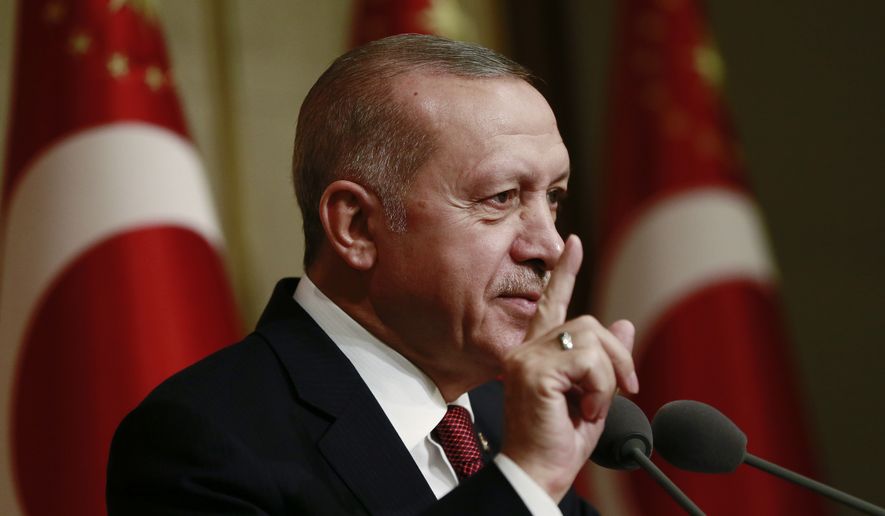A high-level Turkish delegation visiting Washington said Wednesday that Ankara will receive the advanced Russian-made S-400 missile defense system by July, despite Trump administration threats to sanction Ankara amid fears it is shifting increasingly into Moscow’s orbit.
“It is a done deal. It is finished,” Deputy Turkish Foreign Minister Yavuz Selim Kiran told reporters at the Turkish Embassy, echoing comments by Turkish President Recep Tayyip Erdogan, who has brushed aside U.S. and NATO concerns that Turkey’s acquisition of the system from Russia will give the Kremlin new insights into NATO military strategy and capabilities.
Mr. Erdogan made headlines Saturday by saying Turkey will not only to go forward with the S-400 purchase, it has sent 100 engineers to Russia to aid in building the system and will even push to acquire Russia’s more advanced S-500 system in the future.
“After the S-400s, the S-500s are also considered and there will be co-production of S-500s as well,” the Turkish president said in a televised speech, according to Bloomberg. It is “out of the question for us to step back on the issue of the S-400s.”
Mr. Erdogan’s determination underscores friction in the U.S.-Turkey relationship on a range of fronts since President Trump came to office, despite strong diplomatic and economic ties that continue between the allies.
Points of contention have included U.S. military support for Kurdish fighters in Syria that Turkey says are terrorists; Turkish demands that Washington extradite Muslim cleric Fethullah Gulen, whom Ankara accuses of plotting a failed 2016 coup against Mr. Erdogan; American frustration over the Erdogan government’s restrictions on civil liberties; and U.S. federal court charges against Halkbank, a major state-owned Turkish bank, accused of violating U.S. sanctions on Iran.
Analysts say the S-400 issue stands to further strain the relationship amid Trump administration claims that Turkish acquisition could result in NATO intelligence breaches that benefit Russia. At issue, specifically, is the fact that Turkey is separately a major partner and investor in the development of the U.S.-made next generation F-35 fighter jet. NATO and U.S. officials have raised concern that Turkish integration of the S-400 could aid Russian efforts to gather sensitive intelligence on the F-35.
Turkish officials say such concerns are overblown, but the Trump administration so far hasn’t backed down on its threat to level sanctions as a tool to convince Ankara otherwise.
The acquisition of the S-400 “would have serious consequences for the United States and NATO’s defense relationship with Turkey,” State Department spokeswoman Morgan Ortagus told reporters Wednesday.
“We’re clearly willing to engage with [Turkey] and have continued to engage regarding our concerns on this acquisition,” she said. “But there will be very real and very negative consequences if [the acquisition] happens.”
Administration officials have said Lockheed Martin Corp., the developer of the F-35, could move to expel Turkey from the fighter jet’s development program. Turkey could also face U.S. sanctions targeting foreign entities and officials for doing certain types of business with the Russian government.
One Turkish official, who spoke on condition of anonymity Wednesday, sought to downplay concerns over the S-400 deal, saying it did not signal “a strategic shift in Turkey’s NATO position.”
The official also argued that, prior to turning to Russia, Turkish officials spent “more than a decade” trying to convince Washington to sell Ankara a comparable missile defense system only to be repeatedly spurned.
“We had to go to Russia and we made a good deal,” the official said.
• Guy Taylor can be reached at gtaylor@washingtontimes.com.




Please read our comment policy before commenting.